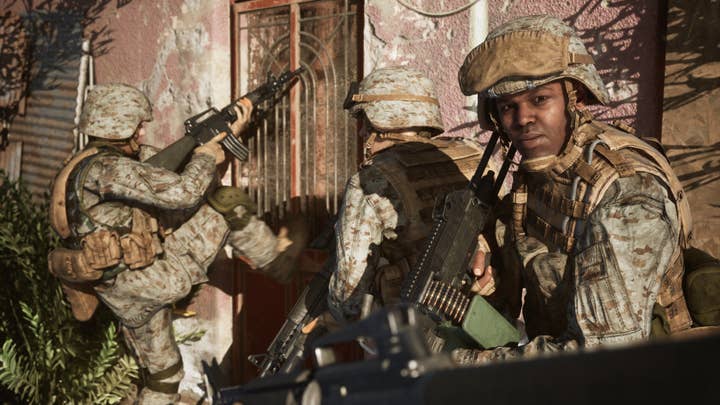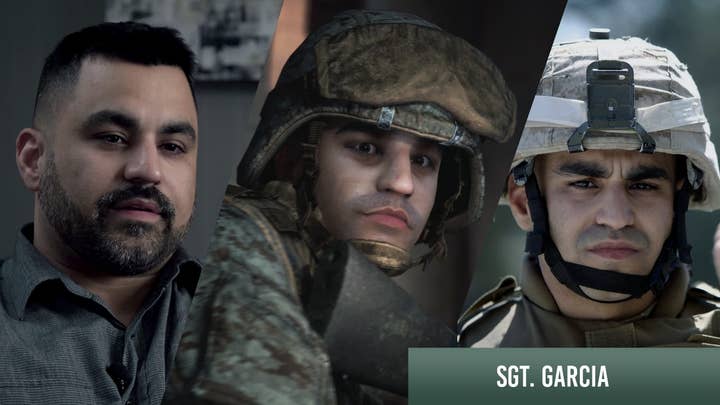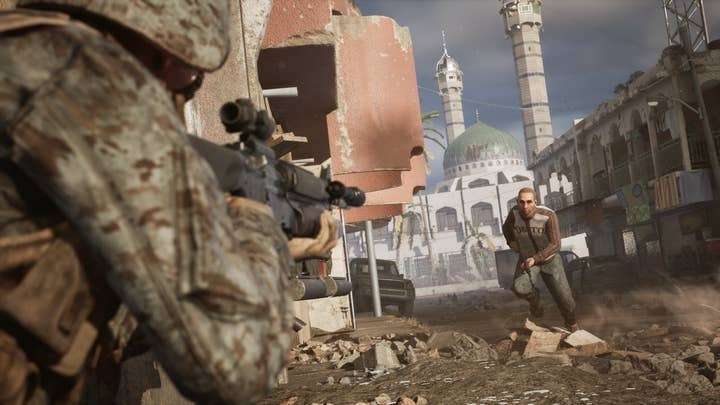Six Days in Fallujah dev: "I don't think we need to portray the atrocities"
Peter Tamte wants to tell the story of one of the deadliest battles of the Iraq War without politics, without addressing why the war started, or what war crimes were committed
"After things exploded in 2009, I effectively left the industry in 2011... [But] I felt an obligation to those [Marines] who shared those stories with me. These are stories that a lot of people could benefit from hearing."
Those are the words of Peter Tamte when asked why he is again pushing forward with the release of Six Days in Fallujah, the first-person shooter attempting to explore the events of the Second Battle of Fallujah during the Iraq War from the perspective of US forces who fought there.
Originally due for release as far back as 2010, it was announced last week the game would be heading to consoles and PC later this year.
Tamte's studio Atomic Games is no longer behind Six Days In Fallujah, which has instead been rebuilt from scratch by Highwire Games -- a firm led by Destiny and Halo veterans -- and published by Tamte's newest company Victura. Even the investors backing the project are completely different, the CEO says.

The project is built around interviews with Marines and other US servicemen who participated in the battle -- testimonies that will be presented in video and audio form before, during and after missions to give the game a documentary-like feel. But, as the title suggests, it focuses on a single battle and ignores the wider context of US forces invading another country on false pretense, bringing with them incredible loss of life.
Tamte acknowledges that "reasonable people can argue the War in Iraq should never have happened," but is most interested in the November 2004 battle where the majority of US forces sent into Fallujah were killed or wounded. He says the stories he heard from soldiers who survived are one of "remarkable courage and sacrifice," and he felt "compelled to tell their stories."
Tamte's first attempt failed when Six Days' original publisher, Konami, dropped the game in 2009 following backlash over its content and premise. Discussions with other publishers fell through and Tamte says he was "forced to abandon" the project -- but this time he is determined to see it through, despite the backlash that has already been rekindled.
"Are we effectively sanitizing events? I don't think that we need to portray the atrocities in order for people to understand the human cost"
Tamte felt if TV and movies could depict the Iraq War that video games should be able to as well. He argued that putting people in the soldier's shoes would teach them empathy and 'hopefully bring people closer together.'
Despite the game refusing to address the question of whether the soldiers should have been there in the first place, Tamte says it's important to provide players with context.
"We can't tell the story without telling the rest of it," Tamte says. "We have to give players the context for why they're in the city, why this battle exists. There were very specific things that led up to the battle for Fallujah. And they're historical events, they're facts, they're not something that a Conservative is going to think is good, and Liberals [are] going to think it's bad, or vice versa...
"Players need that context to understand why they're in the city fighting those Al-Qaeda people. We are going to provide that context, but keep in mind that we can provide that context without making a political statement, or without in any way disparaging the service of those who are actually there to fight."

Like the cause of the war itself, another bit of context that won't appear in Six Days in Fallujah is the use of white phosphorous by US forces, long criticized as a war crime.
"So, players can not use... We're not asking players to commit atrocities in the game," he says. "Are we effectively sanitizing events by not doing that? I don't think that we need to portray the atrocities in order for people to understand the human cost. We can do that without the atrocities."
"You're getting to know the real soldiers as human beings, not just some avatars on screen. That alone is transformational"
Tamte repeatedly emphasised that this game is "not a political statement either way," but it's hard to make that claim when the game is almost entirely told from the perspective of US servicemen.
However, Tamte is also keen to emphasise the scenes where you play an Iraqi civilian, caught in the conflict and trying to escort his family to safety. Like the main missions, these sections have been informed by interviews with civilians who survived the real-world battle -- and they are unlikely to be as controversial as the rest of the game.
It could even be argued that focusing more on this, making a documentary-style game about war from a civilian's point of view would be more palatable to a broader range of people. After all, titles like Bury Me, My Love have conveyed the plight of Syrian refugees without putting a virtual gun in players' hands.
Tamte is unconvinced: "Very few people are curious what it's like to be an Iraqi civilian. Nobody's going to play that game. But people are curious what it's like to be in combat. It's the same reason people play survival horror games -- being in a situation that is beyond what we have in our normal lives. Ultimately, the reason why people are going to play this game is because they want a more realistic combat experience. That above all else is the experience that we must deliver."
Tamte once again points to the use of stories from real combatants, promising scenarios where players will learn about the choices they made that led to the deaths of their fellow soldiers -- and then putting players in situations where they have to make those decisions themselves.
"Those real humans who are a part of the story are on the screen with you, and you're getting to know them as a human being, not just some avatar on screen," he says. "That alone is transformational."

But Activision and EA have both pushed this realism angle in the past, whether it's the interviews with veterans that inform World War II-themed Call of Duty entries or Medal of Honor's 2010 reboot -- just one year after the Six Days in Fallujah controversy -- that brought the series into modern day Afghanistan, where Western forces were still fighting at the time.
"Very few people are curious what it's like to be an Iraqi civilian. Nobody's going to play that game. But people are curious what it's like to be in combat."
Tamte says he's unable to talk about specific gameplay features or design decisions that will illustrate the key differences, but promises more information on the game in the coming weeks.
"90% of the challenges that players face will be consistent with what the actual Marines and soldiers faced: tactical challenges, not moral challenges [that are] effectively completely independent of the controversy surrounding the game. Challenges where the player needs to think through, 'How can I use my toolset to overcome this challenge?'"
That isn't too enlightening. The tactical challenge could well be 'there are four enemy combatants firing at you from behind cover' and that toolset is the selection of guns and grenades at your disposal.
"I hadn't thought about that till you said it that way, but you're right," Tamte admits, reiterating that he's not ready to talk about features yet.
"From the stories we've heard over and over again, real combat depends on coordinated effort from a team. And even though people play on teams, they're playing as lone wolves right now in video games. We have some very good ideas, which we've already tested with players that work very well that get them to execute tactical challenges using the same sort of tactics that were actually used during the battle."
The controversy surrounding Six Days In Fallujah goes beyond the game itself, even encompassing Tamte himself. During his career, he has received US government funding to make training games for the military -- software that is unlikely to be too dissimilar from Six Days In Fallujah.
Victura has already stated that the US government has not funded the game in any way, with Tamte claiming the government only learned of its existence on the day of the announcement.
"It is true that 15 years ago, I built training systems," he says. "And I'm proud of that work that we did building those, but I haven't had any contact with any of that part of the business for at least 11 years now."
Finally, part of the controversy back in 2009 stemmed from how recent the events were. The Second Battle of Fallujah had only taken place five years beforehand, and US troops were still gradually pulling out of Iraq at the time -- an effort that was not completed until the end of 2011.
Opinions will vary on how soon is too soon to revisit such a topic, but Tamte is determined "[not] to wait until this event is no longer relevant to actually deal with it."

